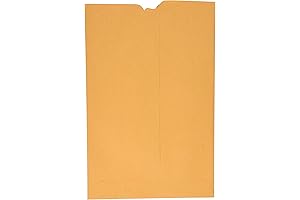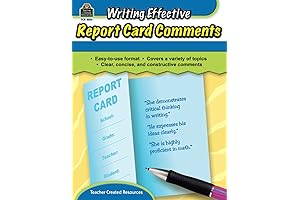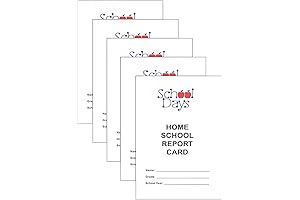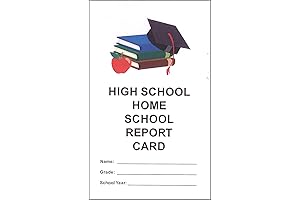· early childhood education materials · 12 min read
The Best Report Cards for Every Grade Level and Subject
Discover the best report cards to track and assess student progress effectively. Our top picks offer excellent features for different grades and subjects, ensuring accurate and informative reporting.
Report cards serve as essential tools for educators and parents to monitor student progress and provide valuable feedback. With numerous options available, selecting the right report card can be overwhelming. This guide presents the best report cards tailored to various grade levels and subjects, empowering you with the resources to make informed decisions.
Overview

PROS
- Covers all essential grade levels (1-8)
- Easy-to-use format provides a clear overview of student performance
CONS
- Customization options could be more extensive
- May not be suitable for schools with unique grading systems
These report cards are an invaluable resource for any homeschooling family. They provide a structured and comprehensive way to track your child's academic progress throughout elementary and middle school. The format is well-organized and easy to use, allowing you to quickly identify areas where your child excels and where additional support may be needed. The included grading system is clear and consistent, making it easy to assess your child's performance against established standards. While the report cards may not be customizable to the same extent as some other options, they offer a solid foundation for monitoring your child's educational journey.
Furthermore, these report cards are an excellent way to communicate with your child about their academic achievements. The detailed sections for each subject area allow you to provide specific feedback and encouragement. They can also be used to set goals and track progress over time. If you're looking for a reliable and effective way to evaluate and document your child's homeschooling progress, these report cards are highly recommended.

PROS
- Easy-to-use and efficient design streamlines progress tracking.
- Comprehensive assessment criteria provide a holistic view of each child's development.
CONS
- Quantity may be limiting for larger preschools or those with multiple classrooms.
- Customization options are somewhat restricted, limiting personalization to handwritten notes.
The Hayes Preschool Progress Report Cards offer a valuable tool for educators to effectively monitor and assess preschoolers' learning development. These report cards provide a structured and efficient way to track children's progress across various developmental domains, including cognitive, social-emotional, language, and physical skills. The comprehensive assessment criteria ensure that a well-rounded view of each child's development is captured.
While the report cards are easy to use and provide valuable insights, some potential drawbacks to consider include the limited quantity and the lack of extensive customization options. Preschools with multiple classrooms or larger class sizes may find the 10 report cards per pack to be insufficient. Additionally, while handwritten notes can provide personalization, the report cards themselves are not highly customizable, limiting the ability to tailor them to specific program needs.

PROS
- Sturdy 28 lb Kraft paper construction ensures confidentiality and durability.
- Standard 6 x 9 inch size fits most report cards and important documents.
CONS
- May require additional postage for heavier documents.
- Not suitable for large or odd-shaped documents.
Securely safeguard your report cards and other confidential documents with these essential Report Card Envelopes. Crafted from durable 28 lb Kraft paper, these envelopes provide exceptional protection against tears and punctures. The standard 6 x 9 inch size accommodates most report cards and other important documents, ensuring a snug fit that prevents contents from slipping out.
These envelopes are perfect for schools, teachers, and parents who need a reliable way to distribute and protect sensitive information. Whether you're sending home grades or sharing important updates, these envelopes offer peace of mind that your documents will arrive intact and secure. Their convenient pack of 100 ensures you have an ample supply on hand whenever you need them.

PROS
- Compact 6 x 4 inch size for easy portability and convenient storage
- Durable index bristol stock construction ensures longevity and wear resistance
- Ample 100-count pack provides sufficient supply for extended use
- Versatile buff color complements various office decors and suits different preferences
CONS
- Limited customization options compared to fully customizable digital tools
- May not be suitable for tracking complex projects with numerous tasks or long durations
Introducing our Weekly Time Report Cards – an indispensable tool for streamlining your time management and enhancing productivity. These compact and portable 6 x 4 inch cards are meticulously crafted from durable index bristol stock, ensuring their resilience against daily wear and tear. The generous 100-count pack offers an ample supply for extended use, allowing you to consistently monitor your time utilization.
The versatile buff color seamlessly blends with diverse office aesthetics and personal preferences. Whether you're tracking individual tasks or monitoring team progress, our Weekly Time Report Cards empower you with the clarity and accountability needed to optimize your time. As a physical tool, they provide a tangible and accessible way to visualize your time allocation, making it easier to identify areas for improvement and foster a culture of productivity within your organization.

PROS
- Empowers educators with practical guidance on crafting constructive and informative report card comments.
- Enhances understanding of students' strengths and areas for improvement, fostering positive development.
CONS
- May require additional time investment in comment writing.
- May not be suitable for all educational settings or student populations.
Writing Effective Report Card Comments offers a comprehensive guide to crafting meaningful and impactful report card communication. It provides educators with a wealth of practical strategies and examples to help them convey student progress and provide constructive feedback. The book covers essential elements of effective report card comments, including using specific and observable evidence, focusing on both strengths and areas for improvement, and aligning comments with learning goals. By following the guidance provided in this book, educators can enhance students' understanding of their performance, foster positive development, and promote a growth mindset.
While the book offers valuable insights and practical tools for educators, it may require additional time investment in comment writing. Additionally, its applicability may vary across different educational settings and student populations. Nonetheless, Writing Effective Report Card Comments is a valuable resource for educators seeking to improve their report card communication and foster student growth.

PROS
- Effortlessly track student progress across essential learning areas
- Provides a comprehensive overview of academic performance and behavior
CONS
- May not be suitable for all homeschooling approaches
- Physical format limits accessibility for online learning
Homeschooling families, rejoice! This remarkable report card pack is meticulously designed to simplify the process of assessing student progress in grades 1-8. Each report card features clear sections for recording grades, attendance, and behavior, empowering you to gain a comprehensive understanding of your child's academic journey. The user-friendly format makes it effortless to track essential learning areas, such as reading, math, science, and social studies.
Beyond academic performance, these report cards also provide valuable insights into your child's behavior. You can easily monitor attendance, effort, and conduct, enabling you to identify areas for improvement and recognize positive behavior. The pack of 5 cards ensures a seamless tracking system throughout the academic year. Whether you're a seasoned homeschooling veteran or just starting your journey, these report cards are an indispensable tool for nurturing your child's academic growth and shaping their educational experience.

PROS
- Streamlined progress tracking for early childhood educators
- Engaging activities foster cognitive, social-emotional, and fine motor development
- Assesses children's academic readiness through interactive games
CONS
- Could include more resources for special needs students
The Pre Kindergarten Progress Report is an all-inclusive kit designed to evaluate the academic preparedness of 3-year-olds. This comprehensive tool empowers teachers with a structured approach for monitoring children's growth in various developmental areas. Through interactive activities, flashcards, and assessment sheets, educators can effectively gauge each child's progress in literacy, math, social-emotional skills, and fine motor coordination.
The comprehensive nature of this kit is what makes it an exceptional resource for early childhood educators. It provides a standardized framework for assessing children's skills, making it easy to identify areas where they excel and where they may need additional support. The activities are designed to be engaging and enjoyable, ensuring that children remain motivated and receptive throughout the assessment process.

PROS
- Simplify communication between teachers and parents
- Pinpoint specific areas for improvement and growth
CONS
- May lack detailed customization options
- Progress tracking may be limited to predefined categories
This report card is specifically tailored to monitor the developmental journey of preschoolers aged 4 and 5. It serves as a valuable tool for educators to paint a clear picture of each child's strengths and areas in need of extra support. By tracking progress across essential developmental domains, teachers can effectively communicate with parents about their child's learning journey.
Parents will appreciate the user-friendly design and the clear representation of their child's performance. The report card allows educators to provide a holistic assessment, encompassing social-emotional, physical, cognitive, and language development. This comprehensive approach ensures that all aspects of a child's growth are considered.

PROS
- Comprehensive tracking of key developmental areas for 2-year-old preschoolers
- User-friendly design streamlines data collection and simplifies progress monitoring
- Detailed observations and anecdotes provide valuable insights into each child's unique strengths and areas for growth
CONS
- Customization options may be limited for specific educational settings
- Relies on subjective observations, which may vary across educators
The Preschool Progress Report is an indispensable tool for assessing and monitoring the developmental progress of 2-year-old preschoolers. Its meticulously designed framework encompasses a comprehensive range of developmental areas, ensuring that every aspect of a child's growth is thoroughly evaluated. Educators will appreciate the user-friendly interface and streamlined data collection process, enabling them to efficiently track each child's progress over time. One of the key strengths of these report cards lies in the detailed observations and anecdotes that educators can include. These invaluable insights provide a nuanced understanding of each child's unique strengths, areas for growth, and overall developmental trajectory.
While the Preschool Progress Report offers exceptional capabilities, it is important to acknowledge its limitations. The customization options may be somewhat limited for certain educational settings, and the reliance on subjective observations introduces the potential for variability across educators. Nevertheless, these report cards remain an invaluable resource for educators seeking to foster optimal growth and development in their young learners. By providing a comprehensive and insightful snapshot of each child's progress, the Preschool Progress Report empowers educators to tailor their teaching strategies and effectively support each child's individual learning journey.

PROS
- Streamlined grading system for comprehensive student evaluations
- Easy-to-use platform with intuitive navigation
CONS
- Lacks some advanced features found in other report card software
- May require additional customization to fully align with specific homeschooling needs
For homeschooling parents who seek a straightforward and effective way to assess their child's academic progress, the High School Home School Report Card offers a solid solution. Its user-friendly interface and straightforward grading system make it accessible to all.
However, it's important to note that the software may not cater to all the nuances of every homeschooling approach. Some users might find the need for additional customization to ensure a perfect fit for their specific curriculum.
Whether you're seeking report cards for homeschooling, preschool, elementary or high school, our curated list caters to your specific needs. Each recommended report card excels in design, functionality, and ease of use, ensuring effective communication between teachers, students, and parents. Embrace the power of these report cards to enhance educational outcomes and foster student growth.
Frequently Asked Questions
What is the purpose of a report card?
Report cards serve as a comprehensive record of student progress, providing valuable insights into academic performance, behavior, and overall development.
How often should report cards be issued?
The frequency of report card issuance varies depending on the educational institution, but they are typically distributed on a quarterly or semester basis.
What information is typically included on a report card?
Report cards generally include grades or assessments for specific subjects, attendance records, behavior observations, and teacher comments.
Are there different types of report cards for different grade levels?
Yes, report cards are designed to align with the developmental needs and curriculum objectives of different grade levels, providing age-appropriate assessment and reporting.
What are some key factors to consider when choosing a report card?
When selecting a report card, consider factors such as grade level appropriateness, ease of use for both teachers and parents, customization options, and alignment with educational standards.













